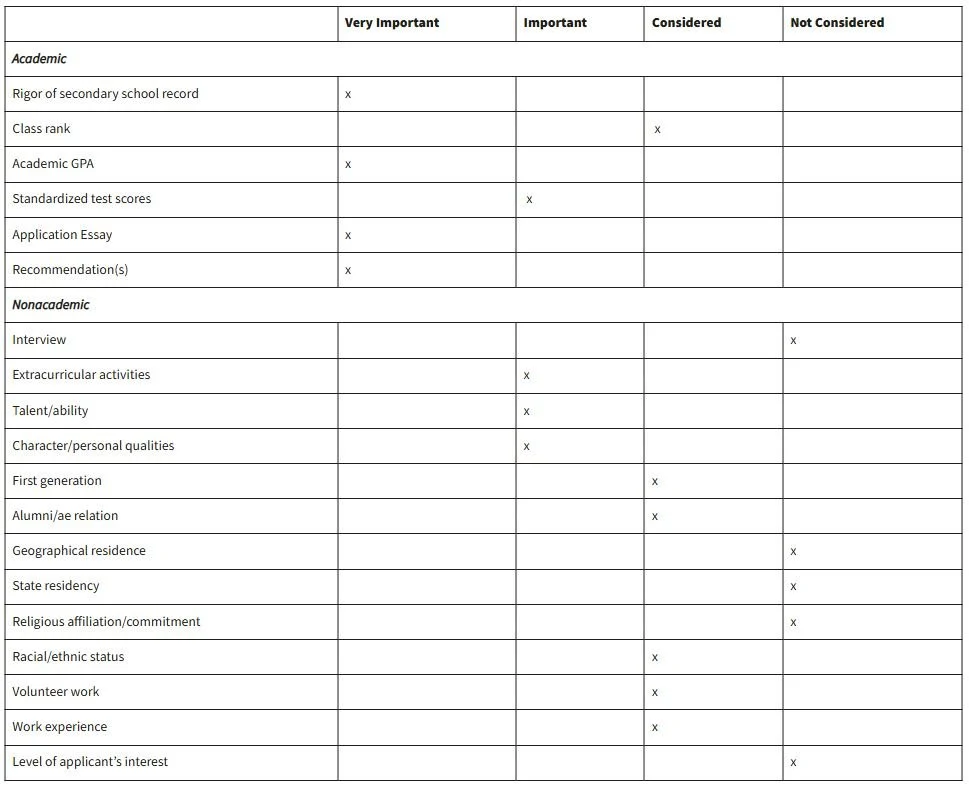What’s the Common Data Set?
Common Data Set tells students what is important in admissions.
Applying to highly selective colleges like the University of Southern California (USC) can feel like navigating a maze. As a parent, you want to know what admissions officers are actually looking for. The good news is, a secret weapon exists: the Common Data Set (CDS).
The CDS is a set of standardized questions and definitions used by most U.S. colleges and universities in collaboration with organizations like the College Board and U.S. News & World Report. It’s essentially a public document where colleges report institutional facts, including crucial details about their incoming class, expenses, and, most importantly, how they evaluate applicants.
The section that reveals a college's admissions priorities is Section C7: Basis for Selection. This chart uses a simple rating system—Very Important, Important, Considered, and Not Considered—to tell you where your student should focus their energy.
USC’s Common Data Set Excerpt
Admissions Blueprint: What Matters Most
Let's use the University of Southern California (USC), a highly competitive institution, as our guide. Based on its Common Data Set, USC rates an application using a holistic review, but with clear priorities.
The "Very Important" Factors (The Must-Haves)
For USC, there are five factors that are non-negotiable—they carry the most weight in the admissions decision:
Rigor of Secondary School Record
Academic GPA
Standardized Test Scores (if submitted, as USC values them highly)
Application Essay(s)
Recommendation(s)
The "Important" Factors (The Differentiators)
These factors are vital for distinguishing a great applicant from a successful one:
Extracurricular Activities
Talent/Ability
Character/Personal Qualities
Your Student's Action Plan for High-Level Acceptances
For your student aiming for top-tier undergraduate programs, performance in these areas must be strategic and sustained. Here is how they can actively improve each high-priority section:
1. Excelling in the "Very Important" Categories
Rigor of Secondary School Record:
Challenge is key. Admissions officers want to see a student push their limits. Your child must consistently enroll in the most demanding courses available: AP, IB, or Dual Enrollment. They should not shy away from math or science courses through senior year, even if their intended major is in the humanities.
Academic GPA:
Consistency and upward trends matter. A high GPA is crucial, but schools also look for an upward trajectory—showing the student improved year-over-year. Aim for A's, particularly in their most rigorous courses. Weighted GPA (which accounts for course rigor) is often what schools like USC prioritize.
Standardized Test Scores:
Be strategic. Even if a school is test-optional, the CDS shows USC values them highly. If your student can score in the top range (typically above the 75th percentile of admitted students), they should submit their scores. Dedicate time to structured preparation for the SAT or ACT, viewing it as a required class.
Application Essay(s):
Show, don't tell. The essay is the only chance for your student's unique voice and perspective to shine. Encourage them to write about a specific, small moment that reveals a large aspect of their character, rather than summarizing their resume. The goal is authenticity, not perfection.
Recommendation(s):
Build genuine relationships. Your student should choose teachers (usually in junior or senior year core subjects) who know them as more than just a grade. They should foster relationships with a couple of teachers, attend office hours, and engage actively in class, giving the teacher rich material to write about.
2. Maximizing the "Important" Differentiators
How to Turn This Into an Advantage:
Extracurricular Activities
Prioritize Depth over Breadth. Instead of joining ten clubs for a month, your student should commit to 1-3 activities and seek leadership roles, create their own projects, or achieve a high level of performance (e.g., qualifying for a state competition, running a successful volunteer initiative). This demonstrates commitment and initiative.
Talent/Ability
Document, Document, Document. If your child has a specific talent (music, research, athletics, art, coding, etc.), they need to be prepared to demonstrate it. This could mean submitting an arts supplement (portfolio or recording), achieving a patent or a publication, or winning a national award.
Character/Personal Qualities
Integrate them into the narrative. Colleges assess qualities like leadership, curiosity, and resilience not through a separate box, but by reading between the lines of the entire application. Encourage your student to showcase these qualities through their essay topics, the descriptions of their activities, and the stories told in their recommendation letters.
